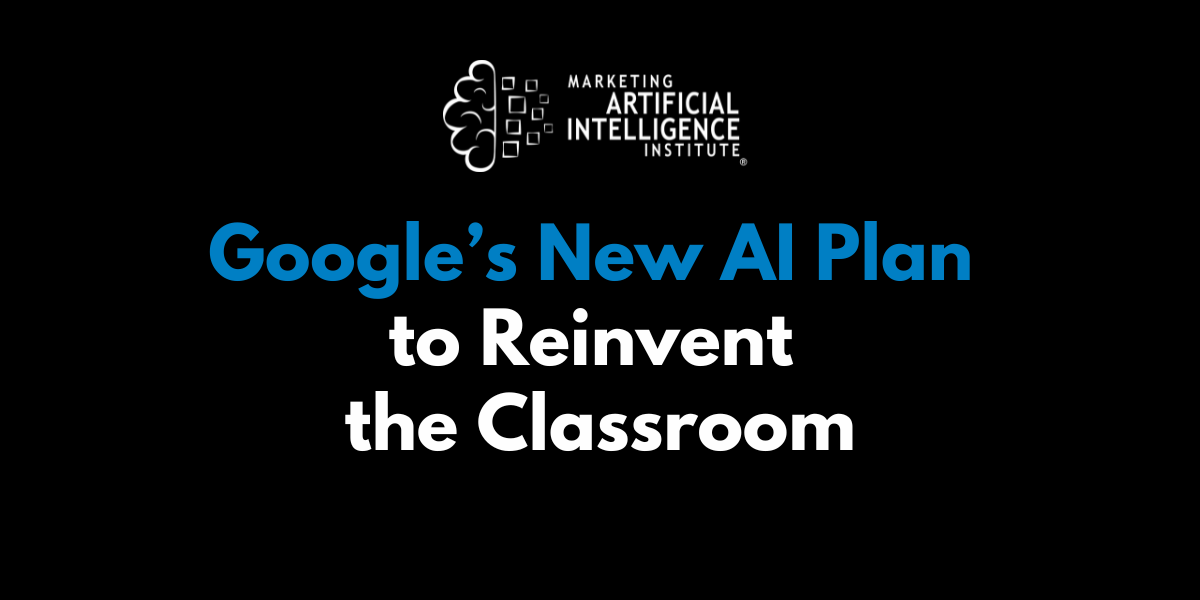Google has published a comprehensive paper detailing its vision for integrating artificial intelligence into global education, outlining how AI could tackle everything from declining academic outcomes to systemic teacher shortages.
The paper, titled "AI and the Future of Learning," argues that AI's role is not to automate teaching but to amplify human educators. It outlines a future where AI personalizes learning at scale, freeing up teachers to focus on mentorship and creativity.
To understand the real-world implications of this roadmap, I discussed it with SmarterX and Marketing AI Institute founder and CEO Paul Roetzer on Episode 179 of The Artificial Intelligence Show.
A New Foundation for Learning
At the heart of Google's strategy is a system called "LearnLM," which embeds core principles of learning science directly into its Gemini models. Google claims this makes Gemini the "world's leading model for learning,” capable of acting as a personal tutor, study coach, or lab partner across its entire product suite, including Search, YouTube, and Google Classroom.
While the paper doesn't contain a major new product announcement, Roetzer noted it provides a critical window into Google's strategy and the gap between its future vision and today's reality.
He views the topic from multiple perspectives: as a parent of middle-schoolers, as a leader in the AI education space, and as a consumer.
A core promise of Google's plan is AI-driven personalization. The paper highlights the ideal of "high-dosage" tutoring, where every student can work within their "zone of proximal development,” or their sweet spot for skill growth. This is something the traditional, one-to-many education model struggles to provide, but which AI could potentially offer to every student.
The paper also confronts one of the biggest challenges AI poses to schools: cheating.
With many high school students already admitting to using tools like ChatGPT for all their assignments, the academic system is struggling to adapt. Google's paper suggests a surprising solution: Instead of trying to create "AI-proof" assignments, schools should shift to forms of assessment that AI cannot easily replicate, such as "in-class debates, portfolio projects, and oral examinations."
What Is Education For in a World With AGI?
This challenge feeds into a more profound question that Roetzer highlighted from the paper: How will AI change what we need to learn or even what it means to learn? If AI can perform most cognitive tasks, what is the purpose of traditional education?
Roetzer connected this to a recent interview with AI researcher Andrej Karpathy, who offered a compelling analogy. "He said, 'I often say that pre-AGI education is useful. Post-AGI education is fun,'" Roetzer explains.
Karpathy’s theory is that in a post-AGI world, education will become like going to the gym. We have machines that can lift heavy objects, so we don't need to be physically strong for labor. Yet, people still go to the gym because "it's fun, it's healthy, and you look hot when you have a six pack."
Karpathy believes education will play out in the same way. You’ll go to school like you go to the gym. It’s for people who want to keep learning because it’s enjoyable and rewarding.
That potential future is why this conversation is so critical.
“This is just a fundamentally critical topic as we move forward, thinking about how we do reskilling and upskilling in a professional environment and how we guide our kids at different levels of education,” says Roetzer.
Mike Kaput
Mike Kaput is the Chief Content Officer at SmarterX and a leading voice on the application of AI in business. He is the co-author of Marketing Artificial Intelligence and co-host of The Artificial Intelligence Show podcast.


